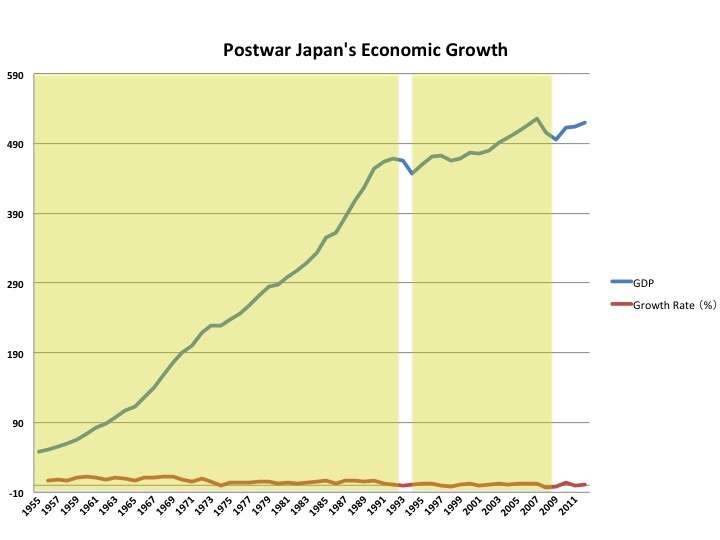Achievements And Flexibility
In addition to the opposition party’s own doings, we must also credit the LDP for some significant accomplishments, especially for achieving economic growth and providing security throughout the Cold War.
The LDP policy of maintaining the Japan-US alliance enabled the country to concentrate most of its resources on economic growth despite being the neighboring Soviet threat.
Under the US protection, the LDP focused on delivering economic benefits to every corner of the nation, remarkably improving the average income and living standards.
Of course, the majority of the credit goes to the ordinary workers, but the scale and nature of Japan’s postwar economic miracle might have been different if not for the LDP.
Had the Socialist Party, who advocated for neutrality instead of the allying with the US, been in charge, things would have turned out different, perhaps for the worse.
Apparently, the LDP’s pragmatic approach eventually paid off and this is something most voters acknowledge to this day.
 The yellow zone is under LDP administration
The yellow zone is under LDP administration
Being pragmatic has also resulted in the LDP to flexibly adapt to the changing environment. Though being portrayed as conservative, the LDP actually has a diverse political spectrum within its own party.
This has allowed the party to perform political reforms that are normally reserved for the more liberal opponents, effectively snatching their speciality.
When the incumbent party can demonstrate “mass appeal” and tackle nearly every issue, it makes them possible to cover voters among various sectors – from rural to urban, elite to non-elite classes, and from conservatives to slightly liberal moderates.
Factions Politics
If political diversity is one of the reasons for success, how is that the LDP managed to evade disintegration unlike the similarly diverse DPJ?
To be clear, the LDP is not immune from internal strife and is far from being a monolith. Serious disputes were frequently observed throughout the 1970s〜1990s, and defeat in party politics would lead to notable figures leaving the LDP to form a new breakaway party.
However, the LDP as a whole has survived multiple crises, something other non-LDP parties were incapable of.
So, what was the difference between the LDP and the late DPJ?
One can point out the existence and unique mechanisms of “factions.”
The LDP is known for having multiple factions, each consisted of likeminded members who play out intra-party politics to get their respective leaders elected as the Party President – a position nearly guaranteeing the seat of prime minister due to the LDP’s constant incumbency.
Interestingly, these factions produce an odd political phenomenon referred as “quasi-regime change”- the changing of administration taking place within the LDP, appearing to function as a de-facto regime change.
But, in spite of major factions striving for power, there seems to be at least two underlying rules carved in everyone’s mind:
(1) refrain from consolidating too much power
(2) avoid breaking the party despite disagreements
Under this implicit understanding of preserving the party, faction members are expected be obedient to their factions leaders, who are shrewd enough to adjust interests and wise enough to avoid dissolution.
As such, governmental/party positions are carefully allocated among factions to maintain the balance of power and solidarity of the party.
 LDP leadership (photo: LDP)
LDP leadership (photo: LDP)
Of course, these faction politics are often viewed as relics of the past, providing fertile ground for corruption. And yes, voters hold a critical stance towards it.
Criticism reached a new level when a gross corruption scandal was recently revealed by the media. Many LDP members among the key factions were accused of embezzlement, enriching themselves at a time when the people faced a soar in living costs.
The scandal was so deep-rooted and malicious that it finally led to the disbandment of major factions, marking an end to a long tradition.
If history were to judge the existence of LDP factions, it would perhaps view them both as a corruption base and a necessary evil for preserving the party.
Though factions are generally do more harm than good, the adjustment mechanism has indeed contributed to preventing a total dissolution, something in stark contrast to the opposition parties who constantly repeat alignment and realignment even over the most slightest disagreements.
Will The Dominance Continue?
Despite all the problems plaguing the LDP, no other party seems to appear financially powerful, politically shrewd, organizationally consistent, and administratively capable enough to be considered as a viable candidate at the moment.
Unless the opposition parties learn from history and regain credibility as a capable actor, LDP reign will remain politically persistent for the foreseeable future.




















Comments